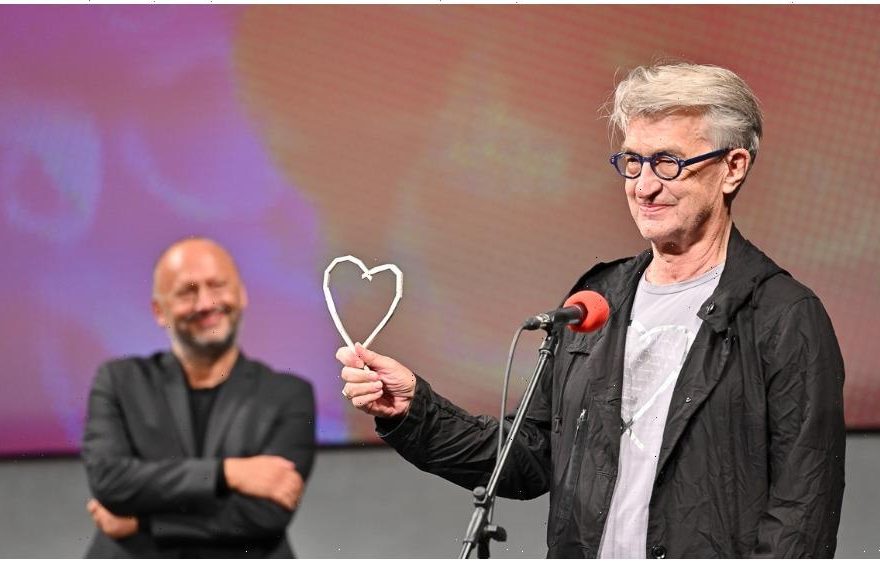Wim Wenders says cinema is facing an “existential crisis” brought on by the coronavirus pandemic and the rise of streaming services, urging film lovers to “fight” for movie theaters, and calling on his fellow filmmakers to rise to the challenge at a time when their voices are needed more than ever before.
“[The pandemic] made me realize how much responsibility we have as filmmakers, and that this crisis that the whole of humanity is going through is also a task for us filmmakers,” he said, speaking to Variety at the Sarajevo Film Festival.
Wenders is at the Bosnian fest this week to accept an honorary Heart of Sarajevo Award in recognition of a lifetime’s achievement in film. “I think no other city in the world could have a heart as a symbol,” he said of the Bosnian capital. “It’s a city that embodies gentleness, and a kindness to communicate between cultures, and to be open. I think Sarajevo has that spirit, and you feel it in the festival.”
Wenders received his award on opening night before the world premiere of “Not So Friendly Neighborhood Affair,” the latest feature from Academy Award-winning Bosnian director Danis Tanović (“No Man’s Land”). He described the open-air screening – his first at a film festival since the start of the pandemic – as “a refreshing, beautiful experience,” adding: “I realized how much we all miss the movie experience in a theater, and that we all have to fight for this to continue.”
A founding member of the European Film Academy, which he led for more than two decades, and a pioneering figure of the New German Cinema movement, Wenders has long been a passionate advocate for the art of cinema – something he feels is threatened by the rise of streaming services and the shuttering of movie theaters across the globe.
“I think it’s all up to us to insist that this culture and this form of experience and this way of living continue, because it is something that is really enriching our lives,” he said. “It depends on us to fight for it and make sure that if we have a choice, that we rather go to the movie theater than the comfortable streaming thing at home, which is not such a great experience after all.”
Wenders expressed his dismay at how swiftly the coronavirus pandemic accelerated the already fast-moving trend toward streaming.
“These 18 months made us get used to – much quicker than we anticipated – the idea that there are other ways to see movies, and we all got used to streaming services,” he said. “I see films on streaming services. I don’t watch them together with other people. And I have not as good a memory of all these films than those films that I actually saw together with others…. It’s a different experience, and therefore, it doesn’t really hold onto you.”
The Sarajevo festival’s retrospective on the long, celebrated career of the German director is highlighting the work of the Wim Wenders Foundation, a non-profit organization established in 2012 to make the director’s extensive archive of cinematic, photographic, artistic and literary work permanently accessible to the public.
Since 2014, the foundation has been digitally restoring Wenders’ films, using the proceeds from their distribution to finance the expensive and painstaking work. “All the movies belong to that foundation,” said the director. “In a way they belong to themselves, they take care of themselves. Everything they make in distribution worldwide – and some of these films are still in demand, and some have become cult movies so to speak – they can take care of themselves.”
On Sunday, Wenders presented a digitally restored version of “The Million Dollar Hotel” at Sarajevo’s National Theater, where U2 frontman Bono made a surprise appearance. The Irish rock star, who co-wrote the script with Nicholas Klein and has producer credits on both the film and soundtrack, presented the movie at the Sarajevo Film Festival more than 20 years ago.
Along with “Hotel,” whose restoration was completed just two months ago, the Wim Wenders Foundation has restored some 20 films from the director’s extensive catalog, including “Alice in the Cities,” which screened in Sarajevo on Saturday night.
“It was unusable,” Wenders said. “The negative was so damaged you couldn’t print it anymore. It took us almost a year to restore it. But now it looks like it’s new. It looks better than ever before. And so the films are now equipped to survive me, which is a good feeling.”
Wenders made his feature directorial debut more than 50 years ago, with the black-and-white “Summer in the City,” shot on 16mm stock by long-time collaborator Robby Müller. Born in Düsseldorf in the dying days of World War II, the German director is reflective on how cinema has provided a guiding light for mankind, especially in its darkest hours.
“If you look at the history of cinema, it’s always been very helpful…in all the crises after the First and Second World War, and the Great Depression,” he said. “Cinema has always been a helpful tool. And cinema has always thrived in these crises and afterwards to remind us what we’re here for and how to live and how to live better and to be responsible for the planet. And I think cinema has a great task in this way in the near future.”
He continued: “We also live through a crisis of truth on the planet right now. The idea of truth is also an endangered species. And filmmakers…have a great task to give people back a certain confidence and an idea that truth exists, and that we are able to tell true stories, and that we are not all dependent on all the fake stuff we get showered with through the internet.”
Source: Read Full Article
